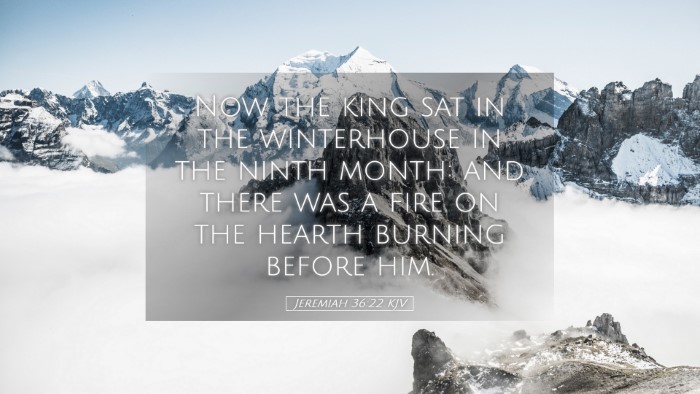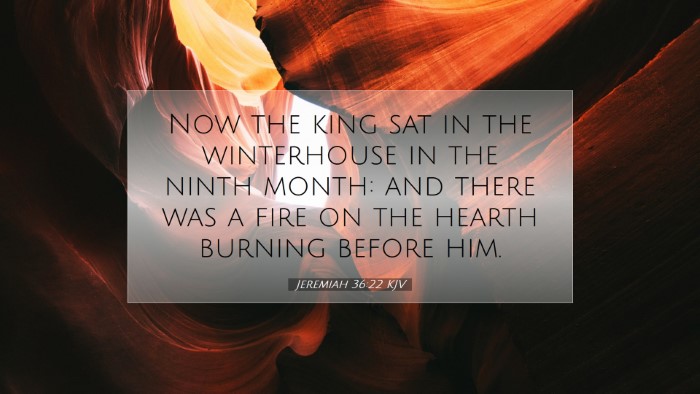Bible Commentary on Jeremiah 36:22
Jeremiah 36:22: "Now the king was sitting in the winter house in the ninth month: and there was a fire on the hearth burning before him."
Contextual Overview
The context of Jeremiah 36:22 reveals a significant moment in the life of King Jehoiakim of Judah. At a time when the nation faced impending doom, this verse captures a scene where the king is focused on the warmth of his winter palace, seemingly oblivious to the prophetic warnings being delivered through Jeremiah.
Matthew Henry's Insights
Matthew Henry emphasizes the stark contrast between the comfort of the king's situation and the dire messages being communicated by the prophet Jeremiah. He notes that despite living in relative luxury, Jehoiakim showed a dismissive attitude toward God’s word. This negligence sets a tone of impending judgment that is punctuated by his actions of disregarding the prophet's warnings.
- The Winter House: Henry suggests that Jehoiakim's winter residence symbolizes a temporal security, a false sense of safety that contrasts with the spiritual decay and impending disaster looming over Judah.
- The Hearth: The fire on the hearth is symbolic of warmth and comfort, representing the earthly pleasures that often distract rulers from their responsibilities towards God's commands.
Albert Barnes' Commentary
Albert Barnes elaborates on the historical significance of the winter house. He points out that this was a time of year when the king, like many others, would be sheltered from the cold, engaged in matters far removed from the crises inflating outside his walls.
- The King’s Indifference: Barnes highlights Jehoiakim's indifference to the prophecies being delivered, which is evidenced by his focus on personal comfort rather than national repentance.
- God’s Judgment: The setting serves as a foreshadowing of the judgment that God would soon bring upon Judah for neglecting His warnings, as symbolized by the very fire that brings warmth but will also eventually consume the city.
Adam Clarke's Analysis
Adam Clarke's commentary focusses on the implications of Jehoiakim's choice to ignore the warnings of God through Jeremiah. Clarke elaborates on the consequences of this disregard, emphasizing the king’s lack of moral and spiritual responsibility.
- The Implication of the Fire: Clarke interprets the fire on the hearth as a metaphor for the fleeting nature of earthly pleasures, which can provide temporary comfort but cannot save one from divine judgment.
- The Ninth Month: The timing of the event in the ninth month holds significance as it is around this time when the judgments of God are often realized, emphasizing a season of darkness contrasted with the light of God’s truth that Jehoiakim chooses to ignore.
Theological Reflections
This account serves as a reminder for leaders, both spiritual and secular, to remain vigilant and attentive to the conditions of their people and their own spiritual state. The complacency displayed by Jehoiakim invites critical reflection on our own responses to God’s word in times of comfort.
- Spiritual Vigilance: The exhortation for spiritual leaders is to not only maintain personal devotion and accountability but to also guide their communities in responding to divine counsel.
- Warnings of Prophets: The disregard for prophetic messages continues to resonate in contemporary contexts, urging a posture of humility and receptiveness towards the teachings of Scripture.
Practical Applications
The practical implications drawn from this verse and its wider context can be significant for personal and communal spiritual life:
- Awareness of Complacency: Recognizing the signs of complacency in our lives, just as King Jehoiakim experienced comfort amidst turmoil, fuels an essential re-evaluation of our spiritual priorities.
- Responding to God’s Word: Individuals and leaders alike are encouraged to actively engage with Scripture, seeking to align their lives with the divine directives rather than succumbing to distraction.
- Community Leadership: Leadership within the church and community should provoke both accountability and a commitment to nurturing a culture of responsiveness to God’s voice.
Conclusion
Jeremiah 36:22 serves as a poignant reminder of the responsibilities of leadership, the dangers of complacency, and the need for a heart that is attuned to God’s will. As we reflect on this verse, let it encourage us to not ignore the divine messages that come our way, especially in times of personal and communal prosperity.


